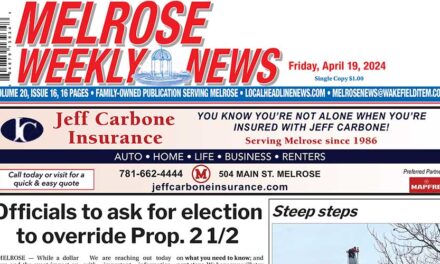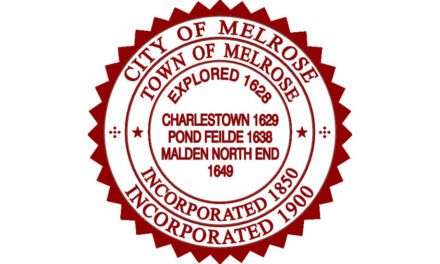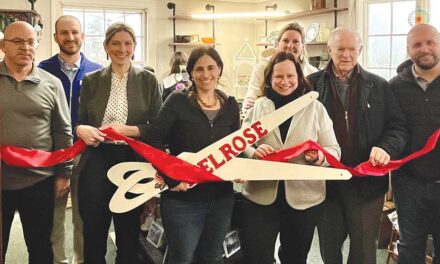Published in the May 12, 2017 edition
MELROSE — City officials presented a $77.4 million spending package this week for the year beginning July 1. It contains a few surprises, not the least of which is a proposal not to raise water and sewer rates in the coming fiscal year.
Mayor Rob Dolan, speaking to the aldermen and the School Committee Tuesday, said the plan continues a “consistent practice of conservative budgeting during my term as Mayor and in fact, with a 2.75% increase, this is the smallest percentage increase in City spending since FY 14.”
The total amount proposed by the mayor is $77,397,009.19.
The mayor, in his annual budget address to the aldermen and school board, said, “This is a balanced budget that was developed using a combination of efficiencies, diversified revenue sources, and reductions. The majority of the increases we see in this budget reflect school spending, health insurance costs, contracted salaries and wages, and necessary operational adjustments.”
Dolan continues:
“This budget also represents the most transparent budget in the city’s history. It does not irresponsibly compromise reserves. It reflects the will of the people regarding staying at our levy limit and follows our ten principles of sound management that we have been practicing for the past 15 years.
“Although a variety of constraints present operational challenges, this city clearly is moving forward with many important initiatives, and I must be clear: The challenging times that we faced in the past never prevented this administration from taking on major issues in this community head-on and finding solutions. We have found solutions to problems in the worst of times that were never solved in the best of times. That is going to continue, and I would like to focus on that this evening.
• I will submit to the Board of Aldermen 0% increases in water and sewer volumetric rates. Furthermore, there will be no increase in ambulance rates. The challenges of water and sewer rates are not simply a Melrose issue. They are a burden shared by the 55 cities and towns under the Massachusetts Water Resources Authority. We have two obligations when it comes to water and sewer rates: Our rate structure must be legal under the laws of the Commonwealth of Massachusetts, and the amount of revenue attained through this rate formula must meet our fiduciary obligation to the MWRA and the Massachusetts Department of Revenue. This Board of Aldermen has learned in the past that when the rates do not meet that financial obligation, the Department of Revenue will come to Melrose, as they did a few years ago, and demand that we institute conservative practices to ensure the solvency of both the water and the sewer fund. The steps we have taken to manage water and sewer rates are absolutely working. They are not driven by politics or quick, easy fixes. Although 0% increases are rare, this year’s rates are driven by three circumstances:
• Due to last year’s drought, the MWRA has brought on many additional communities on a one-time basis. As a result of these additional members, this year’s MWRA rate increase was lower than usual.
• We have successfully completed our reserve plan one year early, in four years instead of five. These reserves are critically important to the long term stability of rates and the financial health of the program. Due to meeting our goal, there is no need to raise rates to meet this obligation.
• We have been able to cut indirect costs by 6.5% in both the water and sewer budgets. This was a goal we set out last year, and we have achieved it.
“Our collective actions have set up water and sewer rates for greater rate stability in the future, not only for the aforementioned reasons but also because we have now fully begun the multi-year I & I program, which will reap great benefits. We have also made great gains with the new water meter installation program, which has reduced estimated reads, allows us to track illegal hookups and losses in water, and allows us to begin an opt-in program for monthly billing.
• This budget represents Year One of a major three-year road program for the City of Melrose. Over the past year our engineering team has done a comprehensive study of our City’s streets and has ranked them based on need for repair as well as anticipated utility and water work. This program touches every corner of the city and will also include a new state program, Complete Streets. The goal of the Complete Streets program is to improve and connect roads and sidewalks for all modes of transportation and for all ages. The Complete Streets program is a partnership between the Commonwealth of Massachusetts and municipalities, and we will be very aggressive in pursuing the funding available over the coming year. Major targeted areas include intersections, school neighborhoods, and business districts, schools, and other community meeting places. Beginning this month, the City of Melrose will be convening a working group to help identify and prioritize up to 15 Complete Street projects that we will submit to the state for funding as part of this initiative.
• This budget includes increased downtown parking. Over the last year, we have made great strides in improving downtown parking with the expansion of the Dill’s Court lot, which added 23 spaces. We also partnered with the Chamber of Commerce to implement a parking plan that places emphasis on customers for prime parking and greater turnover of spaces, eliminating abuse of the previous parking permits. In addition, I am happy to report tonight that we have reached an agreement in principle with the Archdiocese of Boston to add 19 additional spaces to downtown parking. I will submit this agreement to the Board of Aldermen for approval, and it is funded in this budget.
• Bids have come in, money has been approved, and construction has begun on the expansion of the Winthrop and Hoover schools and the renovation of the Horace Mann elementary school. Included in this project is significant site work in all three schools as well as improved handicap accessibility and greater educational equity. When summer turns to fall, we will deliver a top-notch product of great quality and on budget. With kindergarten placement complete, we continue to see classes well over 300, which will continue to present an operational and financial challenge with regard to hiring staff. This is clearly not a bubble but a trend, which shows the health and collective success of a community that is desirable to families and a place where people want to raise and educate their children.
• One year ago we announced the formation of a Public Safety Building Committee, which included citizens and public safety officials, chaired by former Fire Chief John O’Brien; President Conn and I also both serve on the committee. We began the process of bringing to this Board and the community a solution to the issue of a police and fire station that are both over 100 years old. I am pleased to announce that the committee has narrowed the selection process to two architectural firms. In the coming weeks, a firm will be chosen. They will present a set of possible solutions in the fall. The committee will then deliberate and recommend a solution to be presented to this Board of Aldermen for public dialogue and debate, with the final decision to be made by the citizens of Melrose.
I am also excited about the following initiatives in 2018, which include:
• A Citizens Academy, which will increase civic engagement;
• The launch of an online building permit system, which will allow homeowners and contractors to start filling out building permit applications 24 hours a day, 7 days a week, and a software system that will allow online payments for building permits, live tablet inspections by staff, and online permit inquiries;
• The opening of the community garden in June, which will allow people who don’t have yards of their own to have gardens and will improve the health of all Melrosians;
• Planting of nearly 100 trees citywide;
• The construction of a World War II monument at the Knoll this fall;
• The improvements to the soccer field at the West Knoll;
• Using the funds from the National Grid Energy Challenge that the citizens of Melrose completed, we will see solar lighting at the dog park, a solar powered bench at Melrose Common that will allow people to charge their devices, a solar water-filling station at Fred Green Field, and the retrofitting of a DPW vehicle to reduce emissions;
• In partnership with the Northern Bank, a new handicap accessible senior shuttle;
• In partnership with the Friends of the Milano Center, renovation of the second-floor classroom of the Milano Center, as well as full exterior painting;
• A partnership between the library and the Council on Aging to bring books to homebound seniors;
• An upgraded City of Melrose website;
• Release of the new Master Plan;
• New solar-powered speed signals on Howard, Upham, and Franklin streets and West Wyoming Avenue;
• Completion of the wiring upgrade in our public schools to provide reliable WiFi to all students in all classes and allow them to implement computer-based testing for MCAS.
“As we complete Fiscal Year 2017, it is my professional obligation as Mayor and chief executive of this City to advise you of the quite obvious challenges that are before us. I have said for years, and it has never been truer than it is now, that the state and federal government are withdrawing from cities and towns. The federal government provides $2.2 million in direct aid to the City of Melrose. Most of it goes to helping those most in need: special education students, the free and reduced lunch programs, and mandates. As that money goes away, there is nothing to replace it.
“Congress is debating a new health care bill that has the potential to blow a multi-billion dollar hole in the State Budget. These are not my words, but those of our Governor, Charlie Baker. There is no question education and municipal budgets will suffer to close this gap. Current State revenues are $462 million below projections with only two months remaining in the current fiscal year. This means spending is on track to exceed revenue by nearly a half billion dollars. And with the Massachusetts Senate deliberating on the FY18 state budget next, their projections will need to be readjusted and tough decisions will absolutely need to be made.
“Every year, increased state assessments chip away at our local aid, and unfunded mandates continue to grow. That includes this coming Fiscal Year: Our total state aid increased by $206,652, but almost half of that is eaten up by an increase in assessments of $92,751, which leaves the city with just over a 1% increase in state aid over the current fiscal year. I do not anticipate anything stopping this trend, and neither should you. Local aid makes up 18% of our budget and there is no money to replace this loss or to pay for new unfunded mandates.
“Let it be known that the City of Melrose budget is balanced. Our revenue projections are accurate. Our spending is in line with those revenues and we have positioned ourselves with reasonable reserves to maintain our strong bond rating.
“Let no one in this room think that this year’s school budget did not include real pain. Not only the pain of eliminating needed positions but the inability of our public schools to reach their fullest potential, due to the need for increased staff, particularly at Melrose High School. The predominant reason for this is we are spending the majority of our money to address the needs of increased populations in K through 3 that require us to hire additional staff. Almost all our money is going to address that issue as well as providing our teachers with a modest and well deserved raise.
“As someone who has developed and implemented budgets for many years, I have managed through very difficult times and some good times. We have never been on our own more than we are today. I have also never seen as much instability at both the federal and state levels of government as I do today. These are the realities. The answer is not always that we need to tighten our belt or do things in a different way. We have been tightening our belts for 16 years. We have reinvented this city in a hundred different ways to make it more efficient, and that has allowed us to survive and made us the most desirable community in Massachusetts, by all indicators.
“Did we get through this year and does this budget get us through the next? We did, and it does. But these trends are real. This is a solutions-based business and a results-based business. And those who stand for office this year must focus on solutions, not cliché or ideology. My administration has delivered results and solutions for over a decade, and we have a lot more to give, but we need your help—the people in this chamber who are elected and the people who are at home. It has never been harder, and it won’t get easier.
“The budget process is now in the hands of the Board of Aldermen, as the legislative body of the city. Once the budget is passed, this is not the end of the process but the beginning of a new year. And like every new year, there are new resolutions and opportunities, but it can never be forgotten that the process must always be guided by the citizens of our great City,” Dolan said.




